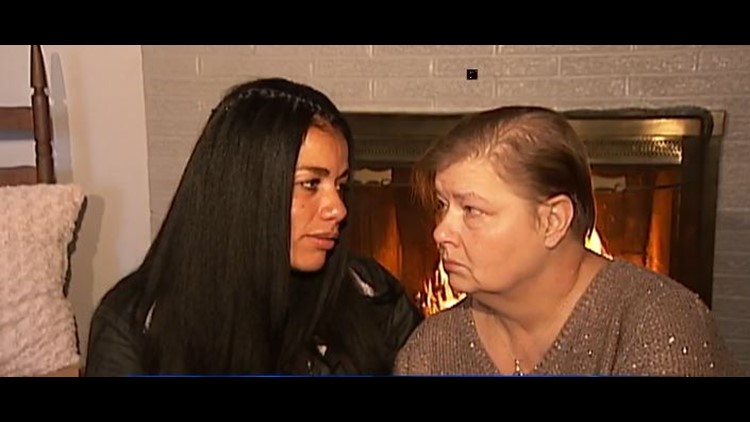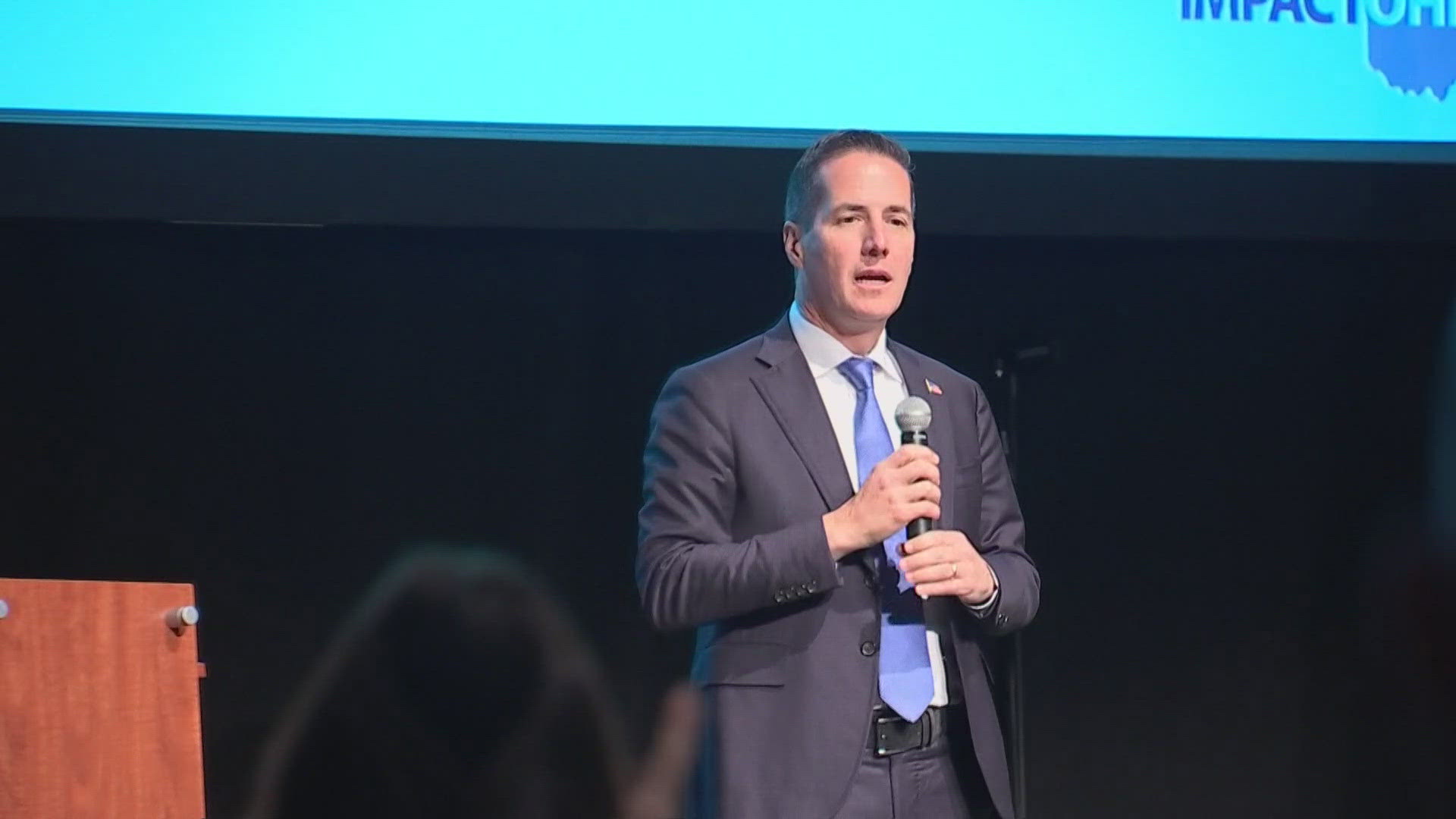CINCINNATI (AP) — Before her parole and release from prison last Christmas Day, Tyra Patterson had to make a five-year plan.
Her goals were to live independently, get a job, travel, see her family and begin speaking in public about criminal justice reform.
"I completed that ... in less than a year," Patterson told The Enquirer in an interview last week from her rented house in suburban Cincinnati.
She knows she is not the typical returning citizen, woman or man. Her case and her insistence on her innocence attracted international support from celebrities the likes of filmmaker Ken Burns and actress Alfre Woodard.
David Singleton of the Ohio Justice and Policy Center became her attorney five years ago and generated more publicity that helped build a roster of re-entry mentors that include a current member of Cincinnati City Council, a former member of Congress, lawyers, business owners and a rabbi.
Patterson even had a job waiting for her as a paralegal at Singleton's firm. It's at this point where her past connects with the major goal she has mapped out in her next five-year plan. She is applying for a Soros Justice Fellowship to create a program that would provide more people coming out of prison with re-entry mentors.
The need is great. The number of women in U.S. prisons rose from 13,200 in 1980 to a peak of almost 113,000 in 2010, according to the Sentencing Project. The analysis by the Washington, D.C.-based research and advocacy group also shows that 1 in 18 African-American women will be incarcerated at some point in her life, compared to 1 in 111 white women.
Patterson said she saw opportunities for self-improvement in prison and made them happen. Mentors have helped make her re-entry successful.
"I wouldn't be where I am without them," she said. "They didn't just guide me. They held my hand.
"For so long, people have leveraged their privilege for me. They were my voice when I didn't have one. They kept me strong and believing in me. I understand that now I can leverage my privilege for those who are incarcerated. I can't walk away and forget them."
A year ago Christmas morning, Patterson walked out of the Northeast Reintegration Center in Cleveland and kept a promise she'd made to God. She dropped to her knees in the snow, kissed the ground and gave thanks for her freedom.
Patterson had been in custody since being arrested and one of five people ultimately convicted in the shooting death of a 15-year-old Dayton, Ohio, girl, Michelle Lai. The incident unfolded in the early morning hours of Sept. 20, 1994. Patterson was 19, had dropped out of school at 11, and was illiterate.
A jury found Patterson guilty on one count of aggravated murder and four counts of aggravated robbery. She was sentenced to 43 years to life in prison but maintained that she and another girl walked away before the shooting. Patterson did admit to picking up a necklace off the pavement that belonged to one of the robbery victims.
Among those moved by her story to ask for her early release was Hamilton County's tough-on-crime Republican prosecutor, Joe Deters, who met with Patterson in prison in 2016 and said, "Justice has been served. She's been in there long enough."
In the first of the several presentations that she has made to high school students since her release — Aiken High School on Feb. 1 — Patterson told that piece of her story.
She warns them about the dangers of dropping out and using marijuana. She says that even after the mistakes she had made that she realized she had an opportunity to make herself better.
While in prison, she learned to read and write and completed a GED. She also earned a steam engineer's license and a paralegal certificate. She would start work Jan. 25 as a paralegal at the Ohio Justice and Policy Center, Downtown. The client became an employee. She often walked to work from her apartment on Vine Street in the north end of Over-the-Rhine.
She estimates that in her first year of freedom that she made 50 public appearances and spoke to 4,500 students from middle school to law school. She has told her story to students at Turpin, St. Xavier, Walnut Hills and DePaul Cristo Rey high schools, the latter among those she mentored electronically while in prison.
At Cristo Rey, a religion teacher introduced her students to Patterson's story while she was still in prison. Some students then met with Singleton and helped create the #FreeTyra campaign.
Donald Whittle, 17, now a junior from Finneytown, was among the students most engaged with her case. Patterson visited the school in the spring.
"Her story is important to me because it's about overcoming obstacles," said Whittle, an African-American. "She was in the wrong place at the wrong time. It made me evaluate my friend group and who I hang around with."
A couple of times, Patterson said, high school students told her after her speech that her message convinced them not to try to take their life.
"I talk about how important it is to hang on tightly to hope," Patterson said. "I did."
She has spoken to groups of public defenders in St. Louis, Atlanta and Mobile, Alabama. She delivered a keynote address at a youth rally in Shreveport, Louisiana, and was a featured guest speaking to students at Harvard and Northwestern universities' law schools near Boston and Chicago, respectively.
"It's not easy getting up and being transparent and vulnerable," Patterson said at home, as her miniature Husky, named Diva, and a rescue cat, Dainty, took turns sitting on her lap. "I want to change somebody's life. If somebody had told me not to drop out, it might have changed my life."
Patterson's speaking engagements often end with students swarming around her for a hug, to shake her hand or pose for a selfie with her. She is a warm, engaging speaker — "real" is a common description — smiling and making eye contact. Professionally, she pulls her long, dark hair back and tight off her forehead, revealing, at 43, an increasing number of gray hairs. She cuts an athletic figure. She trained with one of her mentors, Jean Schmidt, former Representative for Ohio's 2nd congressional district, and completed with Schmidt the 5-kilometer race in the Flying Pig in early May.
Attorney Singleton and another of her reentry mentors, Cincinnati councilwoman Tamaya Dennard, have traveled with Patterson and attended some of her local presentations in schools and to community and faith-based groups.
"I sometimes worry that she has taken on too much, and I try to tell her to slow down," said Singleton, Justice and Policy Center executive director. "But then I realize that she is working as hard as she can to make up for 23 years that she lost."
Patterson can make up for some things lost to time. With Dennard's help, Patterson in April — a month before her 43rd birthday — earned her first license. She has a car. Her personalized plate refers to her employer, which promoted her in April from paralegal to the newly created position of community outreach and education specialist, which allows her to educate the public about OJPC's work to reform Ohio's criminal justice system.
Away from work, she likes to shop in second-hand stores and road-side flea markets. She's a self-confessed neat freak, and while an Enquirer photographer was setting up additional lights in her home for a portrait beside her Christmas tree, Patterson refilled air freshener containers and scooped her cat's litter box.
She is regaining rights as a citizen she didn't have while serving prison time. She voted for the first time in May's primary and said she won't miss another election. When Fifth Third Bank refused to allow Patterson to open a bank account on Jan. 31 — she did not have a required second form of identification — she went down the street and opened one at a PNC branch. The ensuing negative publicity caused Fifth Third to change its policy
In late summer, she moved from the Over-the-Rhine apartment to the suburbs. Two months later, on Oct. 17, Cincinnati City Council passed a unanimous resolution honoring Patterson "for her courage and perseverance and efforts to improve her life and those of many others."
Dennard said of Patterson, whom she now refers to as her best friend, "She dispells what people in prison look like, those negative social norms."
For all of her positive energy and forward-looking vision, Patterson said she has missed out on some things and faces a closing window of opportunity for others.
"I'm just now starting a 401(k)," she said. "I want to have a child."
Yet she has no time for a relationship with a man, she added.
In addition to starting a re-entry mentoring program, Patterson is involved in art programs for prisoners and those who have been released.
She paints. She also advocates. Patterson proposed to ArtWorks, the nonprofit responsible for many of the city's murals, to create one depicting returning citizens who've come home to make a positive difference in their community. Patterson leads the project and is hiring six artists, some with criminal records. Completion is expected mid-year 2019.
In September, she was in Cleveland as a panelist discussing prison reform, an event tied in with the opening of the Prison Nation exhibit. A month later, Patterson was in Columbus, where she exhibited a painting, titled "Midnight," that she completed in prison. The event was the second annual Ohio Prison Arts Connection, an effort to increase arts and creative medium to people while incarcerated.
At the same time, she has her eye on another type of prize: clemency. Singleton filed with Ohio Gov. John Kasich in 2016.
"I want my name back," she said. "I don't want to have to face any more barriers."
Though Kasich has not yet acted, Patterson's clemency push received a major boost in April 2016. That's when Holly Lai Holbrook, the sister of the woman killed that night in 1994 in Dayton, told the governor that Patterson should not have been convicted of murder.
The victim's sister said Patterson was not with the group of people who robbed and killed her sister.
In the meantime, Patterson keeps traveling and telling her story where she thinks she can help force positive change.
The week before Christmas, she and Dennard were in New York to meet with a producer for "The Dr. Oz Show." No film or air dates are yet scheduled. Patterson said show executives want her to talk about her life journey but also the health challenges she deals with: the chronic autoimmune disease lupus, colitis and Crohn's disease.
"All the preservatives in the institutional food I ate for 23 years," she said.
Yet here, as with the time she served for crimes she said she did not commit, Patterson said she is not bitter.
"I lost more than half my life to the system," she said. "I want to live my best life. Me giving back is part of my survival."
With that, she put a coat on over her sweater and blue jeans. The heels of her leather boots clacked as she raced down the wood steps of her split-level home and out the door. She had to get to the store to buy a few things for her trip the next morning to New York.



